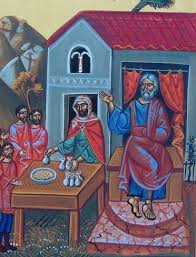Chapter Talk – 33rd Sunday of the Year – November 15, 2020, cycle-A
The gospel reading for this Sunday is the parable of the talents (Mt 25:14-30). The talents are distributed to three persons: one gets five, the second two, and the third one talent, “each according to their ability”. According to Sr. Carolyn Osiek even one talent was a large amount of money. To note one scriptural source that she mentions, she says that just one talent, according to the book of Maccabees (8:11), was “the price for ninety slaves” (Give Us This Day, p.164, November 2020). Why, then, would the servant who had the one talent go off and bury it? What is the dynamic motivating his action? We are told that the person with the one talent perceived his master as ‘demanding’, ‘harvesting where he did not plant’, and ‘out of fear’ he went and buried the talent. Perhaps one reflection out of this gospel is to ask ourselves how does fear control, hinder, or immobilize us in doing something with the one talent, the gift God has given us?
Here is what Pope Francis says: “This servant did not have a trusting relationship with his master, but was afraid of him, and this hindered him. Fear always immobilizes and often leads to making bad choices. Fear discourages us from taking the initiative; it induces us to take refuge in secure and guaranteed solutions, and thus end up not accomplishing anything good. To move forward and grow on the journey of life, we must not have fear; we must have faith” (Angelus, November 19, 2017). To do something with the talent God has given us begins with our relationship with God, with the level of trust we have. If we know concretely within the heart, the love that is at the center of our relationship with God, this love co-exists with trust. God’s love for us, if received, elicits not only our love for God but a trust in God to always be the fertile ground and center of our lives. Doing something with the gift or gifts given us by God is something we are empowered to do because of this essential relationship. It is true that our image of God, of how we see God impacts this relationship. The man in the parable was afraid of his master. He imaged God as demanding and hard, reaping where he did not sow. When we are taken by fear, whatever creates the fear: pandemic, illness, the world situation, my own feelings of being inadequate, and so many other things, it is a call to return to God…to return to the God of love…the God of mercy and compassion, the God that Jesus embodied in and through his life, death and Resurrection.
The power of fear: observe how it impacts our life…how it diminishes creativity, how it diminishes ourselves and one another, diminishes even who we are. The power of faith: it can move mountains, it only has to be the size of a mustard seed to be generative and fruitful (Mk 4:31-32)…In Jesus’ teaching and healing we hear that faith saves us…‘Go, for your faith has saved you’ (Mk 5:34).
He was afraid…she was afraid…and thus she went and buried the gift of God. Burying the gift of God, keeping one’s light under a bushel basket (Mt 5:15): these images tell us that we are not generative, we are not bearing fruit when caught in this inner dynamic. It reflects a lack in our relationship with God. We are endowed with the very presence of God’s love and generative life. The gift of God bestowed on each person is worth much. We feel miserable, unfulfilled when we fall into the malaise of burying and hiding the gifts we are each blessed with. If our relationship with God is intact, it will empower us to humbly use those gifts for the building up of God’s life within the small piece of earth entrusted to us. We don’t have to do ‘big’ things. The small is powerful, like the parable of the mustard seed (Mt 13:18-19)…the small grows as it joins with other small actions from other sisters and brothers…the small action emerging from a heart that is growing into Christ’s heart…incarnating one’s gift in this way is building up not only the community in which we are living but it is also building up the larger kingdom of God’s peace, justice and love.
In the Pope’s talk on the Fourth World Day For the Poor he quotes Sirach: ‘In everything you do remember your end’ (7:36). To bury our talent is a statement against the God to whom we desire to serve. Burying our talent reflects what our end will be: we will feel unfulfilled, something in our relationship with God will be broken. Jesus so often in his teaching tells us ‘Do not to be afraid’…His words are a call to faith, a living faith….we have him who goes ahead of us…blazing the way forward to what it means to be alive, generative, fruitful, serving with the whole of our selves God, one another and all of created life. The reality of fear will not go away. Paradoxically, fear can open the way for a deeper faith. This is why our relationship with God is so pivotal. The God-human relationship helps us to meet our fears and to transform the energy that is caught in the fear so that we can be bold, daring and humble as we invest with our lives the gift God has given us.
“Grace works on nature” (quoted in Give Us This Day, p.161): fear is a very human emotion. And then there is grace: do we have enough faith to allow grace, which flows out of our relationship with God, to transform our fears so that we will bear fruit with the gifts God has given us.


